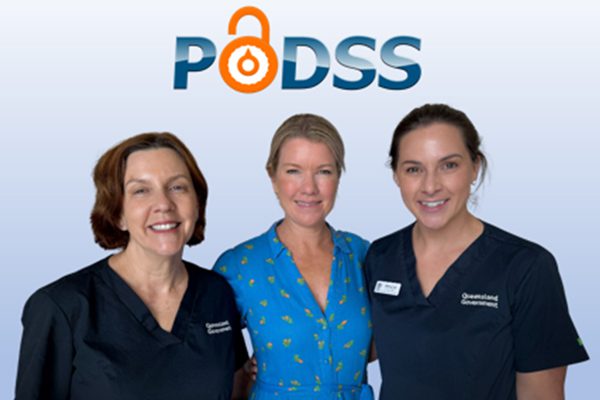STARS Post-Operative Discharge Support Service (PODSS) reassuring patients after surgery

L-R Jane Holt PODSS CNC, Katie Burke CNC PODSS Project and Rebecca Pickering PODSS CNC
The Surgical, Treatment, and Rehabilitation Service (STARS) is piloting a new Post-Operative Discharge Support Service (PODSS), a telehealth pathway for patients who are discharged and have post-operative concerns or questions.
The service aims to improve patient access to care following their procedure and avoid representations to Metro North emergency departments.
All post-operative patients (excluding plastic surgeries) discharged from STARS and within 30 days of their procedure date are eligible to access the service via a mobile phone number.
Clinical Nurse Consultant (CNC) for PODSS project Katie Burke has already seen a big demand for the service.
“PODSS improves the quality of post-operative care by providing patients with a place to ask any questions or report any post-surgery concerns to a Clinical Nurse Consultant. In the first five weeks of operation, we already had over 305 calls to the service,” Katie said.
“The calls have been a mix of queries regarding pain and pain relief, wound care, general post op follow-up advice to more serious complications requiring streamlining to appropriate services.”
One of the best examples of the use of PODSS is for tonsillectomy patients. These patients’ pain often peaks on day 4 – 6 after surgery but this can be a concern to them as they expect pain to improve as time goes on.
These patients can call PODSS to discuss their symptoms and the CNC can usually optimise their pain relief regimes and reassure patients or provide appropriate interventions where necessary.
“Since PODSS go-live, no tonsillectomy patients have attended ED with pain as their presenting complaint. This is a significant decrease in ED presentations and highlights the effectiveness of PODSS,” Katie said.
As well as provide reassurance about normal post-surgery expectations, Katie said the service can also detect a possible serious complication early on so that it can be treated early.
“One of our calls to PODSS was a patient complaining of right shoulder pain. After listening to their symptoms and collecting collateral information, we were able to facilitate a streamlined ED presentation at their local emergency department where they were diagnosed with a pulmonary embolism,” she said.
“Had PODSS not been available and easily accessible, this patient acknowledged they would have waited considerably longer to get medical attention and potentially had an adverse outcome.”
Patients who have accessed the service have been very appreciative of the support that PODSS provides.
“I was thankful that I could reach out to professional and qualified staff, when I was a bit worried after my surgery. She put my mind at ease. Thank you so much,” one patient commented.
“The nurses at PODSS have been excellent, very supportive, informative and reassuring. I don’t think I could have coped without support from PODSS,” another patient reported.
The PODDS trial will continue until June 2024.
PODSS has received funding to continue until end of June 2024 at STARS.
